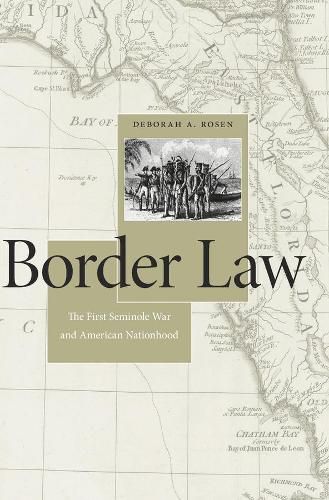Readings Newsletter
Become a Readings Member to make your shopping experience even easier.
Sign in or sign up for free!
You’re not far away from qualifying for FREE standard shipping within Australia
You’ve qualified for FREE standard shipping within Australia
The cart is loading…






The First Seminole War of 1816-1818 played a critical role in shaping how the United States demarcated its spatial and legal boundaries during the early years of the republic. Rooted in notions of American exceptionalism, manifest destiny, and racism, the legal framework that emerged from the war laid the groundwork for the Monroe Doctrine, the Dred Scott decision, and U.S. westward expansion over the course of the nineteenth century, as Deborah Rosen explains in Border Law.
When General Andrew Jackson’s troops invaded Spanish-ruled Florida in the late 1810s, they seized forts, destroyed towns, and captured or killed Spaniards, Britons, Creeks, Seminoles, and African-descended people. As Rosen shows, Americans vigorously debated these aggressive actions and raised pressing questions about the rights of wartime prisoners, the use of military tribunals, the nature of sovereignty, the rules for operating across territorial borders, the validity of preemptive strikes, and the role of race in determining legal rights. Proponents of Jackson’s Florida campaigns claimed a place for the United States as a member of the European diplomatic community while at the same time asserting a regional sphere of influence and new rules regarding the application of international law.
American justifications for the incursions, which allocated rights along racial lines and allowed broad leeway for extraterritorial action, forged a more unified national identity and set a precedent for an assertive foreign policy.
$9.00 standard shipping within Australia
FREE standard shipping within Australia for orders over $100.00
Express & International shipping calculated at checkout
The First Seminole War of 1816-1818 played a critical role in shaping how the United States demarcated its spatial and legal boundaries during the early years of the republic. Rooted in notions of American exceptionalism, manifest destiny, and racism, the legal framework that emerged from the war laid the groundwork for the Monroe Doctrine, the Dred Scott decision, and U.S. westward expansion over the course of the nineteenth century, as Deborah Rosen explains in Border Law.
When General Andrew Jackson’s troops invaded Spanish-ruled Florida in the late 1810s, they seized forts, destroyed towns, and captured or killed Spaniards, Britons, Creeks, Seminoles, and African-descended people. As Rosen shows, Americans vigorously debated these aggressive actions and raised pressing questions about the rights of wartime prisoners, the use of military tribunals, the nature of sovereignty, the rules for operating across territorial borders, the validity of preemptive strikes, and the role of race in determining legal rights. Proponents of Jackson’s Florida campaigns claimed a place for the United States as a member of the European diplomatic community while at the same time asserting a regional sphere of influence and new rules regarding the application of international law.
American justifications for the incursions, which allocated rights along racial lines and allowed broad leeway for extraterritorial action, forged a more unified national identity and set a precedent for an assertive foreign policy.